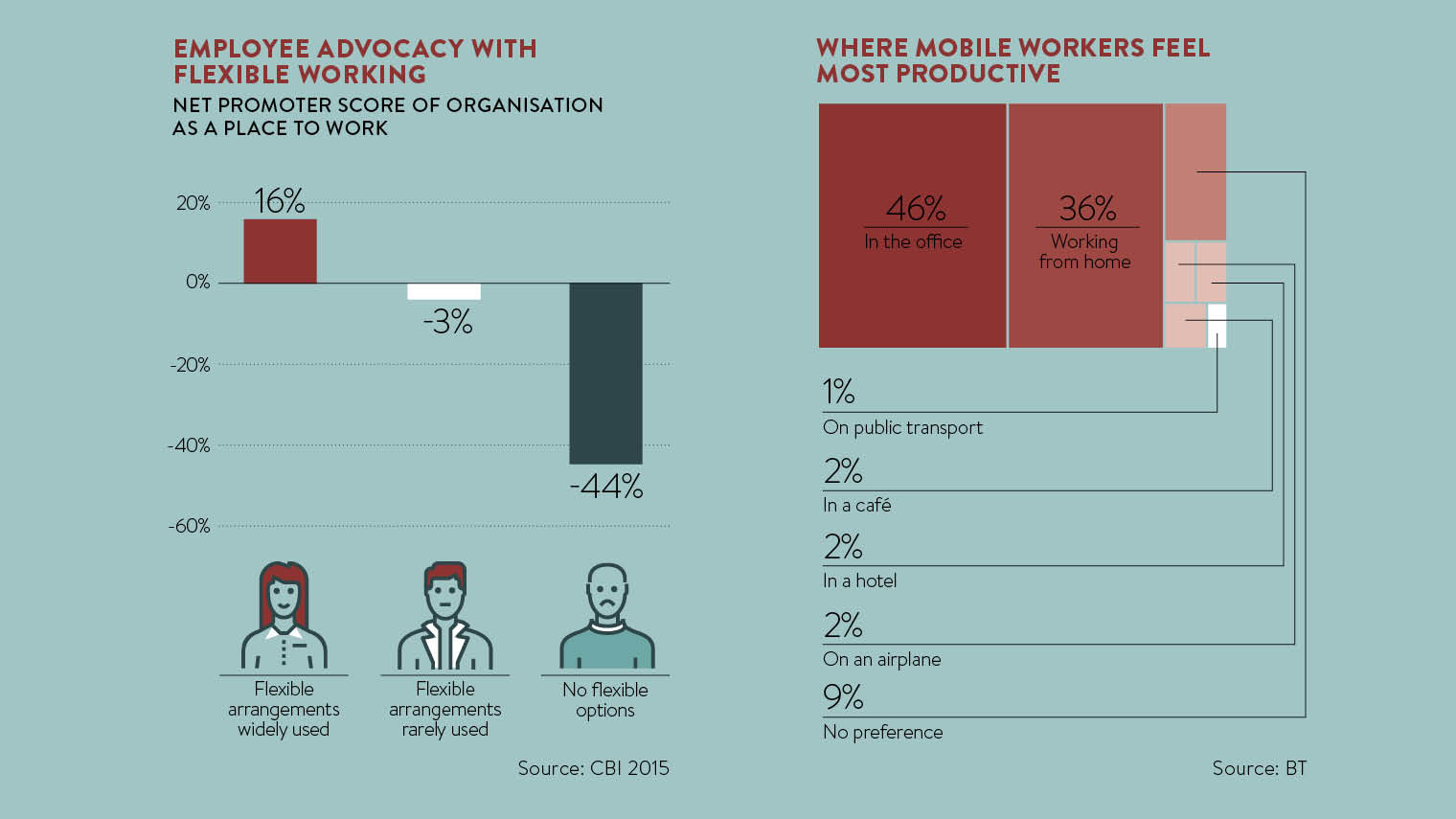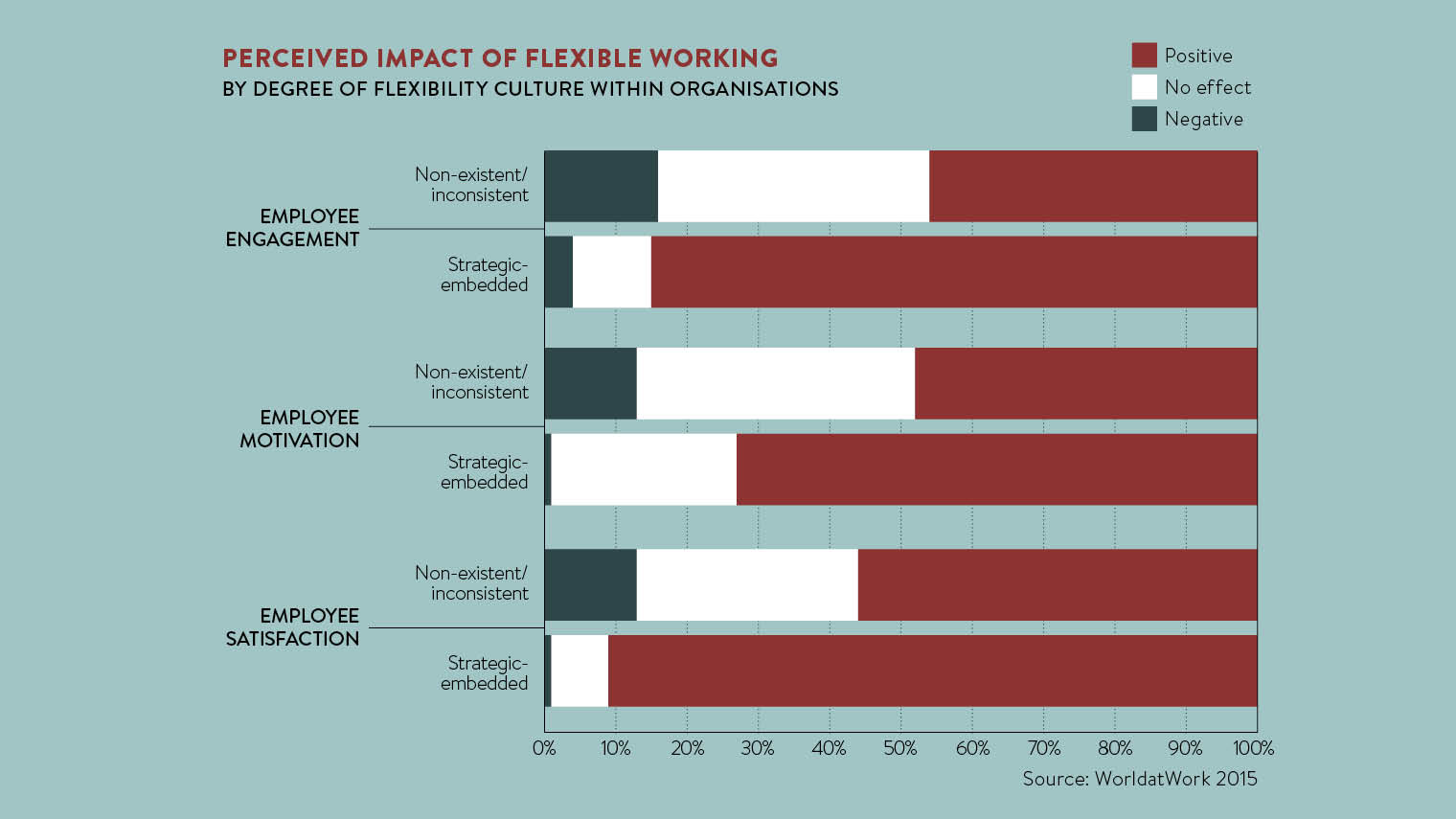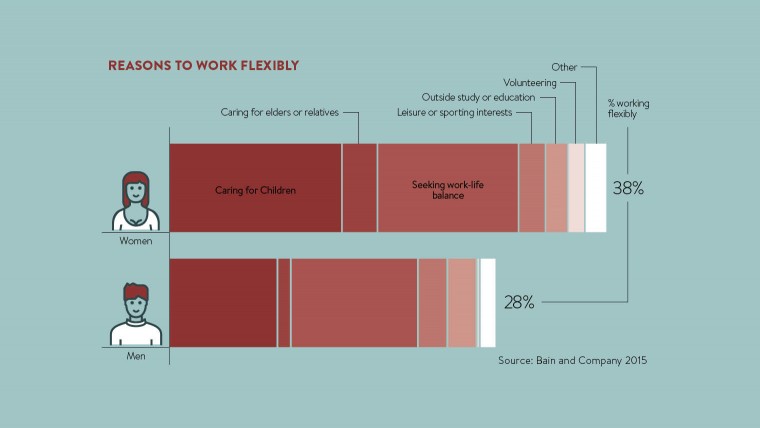With Flexible Working 1.0 we saw employees offered flexitime. If staff arrived an hour early they got to leave an hour early. For those with tricky childcare issues or idiosyncratic body clocks it was a blessing.
Now we have version 2.0. Companies are incorporating all sorts of employee demands into their flexible working offer, from job-sharing and on-site nurseries, to duvet days and “free-ranging”.
Job-sharing options
Trudie Powell and Louisa Taylor are pioneers at job-sharing. They pair up to do a single role at computer brand Dell.
“When I had my daughter six years ago, I wanted to come back to work, but not full time,” recalls Ms Powell. She’d built a career as a sales rep at Dell dealing with global top-500 corporations. “I discussed the options with my manager and Dell were able to be flexible.”

For the full infographic click here
A colleague, Ms Taylor, was also on maternity leave, so it was agreed the two would come back and share the job. “Everything is split down the middle,” says Ms Powell. “Two-and-a-half days’ each. She does the first half of the week. I do the second half. We hand over mid-way.”
The trick to a smooth job share is the handover. “We put in a lot of effort to make sure it’s seamless,” says Ms Taylor. The arrangement means both mums get to devote time to their children. And Dell get happy, committed and refreshed workers. “Dell gave us a shot and we’ve proved it works,” adds Ms Taylor.
It’s also worth considering an “ease in, ease out” policy for mums. At public relations firm Golin, mums-to-be get reduced days, compressed hours or work from home to make medical appointments and commuting easier. They then gradually build up from two days a week to their chosen working hours as they return.
Building a ‘people’ business
Maternity, adoption and shared parental leave are well in excess of the statutory minimum – eighteen weeks for shared parental and six weeks for paid paternity leave.
Golin managing director Bibi Hilton explains the payback: “So does any of this actually matter from a business perspective? Absolutely yes. It’s expected today that employers are flexible, family-friendly and supportive, and as a people business, our success is based on being able to attract and retain the best talent in our industry.
“Last year 100 per cent of our mums returned from maternity leave, up from 82 per cent in 2013 and our overall retention rates also rose 5 per cent in the same period. So yes indeed, our progressive approach is helping us to attract and retain the brightest talent.”

Holiday time is a key area for flexible working. The gold standard is Sir Richard Branson’s “unlimited holiday” at Virgin. But how does it work? App creator Musement, the brand behind the very popular travel activities app of the same name, also offers no limit to the amount of holiday staff can take. Madness?
“It’s a surprisingly easy policy to instigate and manage,” says Musement chief executive Alessandro Petazzi. “An employee agrees what they want to do with their team and the team agrees it together with no intervention from top management. They have a shared calendar so they know who is away and when, and management doesn’t approve or disapprove holidays, trusting that the team will work together. It’s worked superbly so far.”
Our progressive approach is helping us to attract and retain the brightest talent
Any mickey takers? “So far there have not been any employees taking advantage,” says Mr Petazzi. The key, he says, is to be the sort of company which people feel positive about and don’t want to escape from.
“I am unsure if it would work in a disengaged employee situation where trust is not already present. If trust is already a difficult issue you will probably open the door to abuse and in a larger organisation it may be harder to manage,” he says.
Media agency The Specialist Works gives staff two BOB – boozed or burnt – days. Operations director Tom Wilson says: “These two days can be used for anything. If you’ve spent the last couple of days pulling together a pitch and need a rest or those drinks on a Thursday night went on a bit late and the thought of work on Friday is worse than the hangover – these are all legitimate reasons for staff to use BOB days.”
Agile working
Even supposedly traditional white-collar sectors are embracing total flexi-working. Accountancy giant Deloitte uses what it calls agile working. This means choosing where you work and when. Output, not hours, is what counts.
Emma Codd, managing partner for talent at Deloitte, says: “I have never missed a school event and work from home one day a week so I can drop off and collect my children. I am able to do this because I am judged on output, trusted and respected to make the right choices, and because I am open and honest about the way that I work. And my colleagues, in turn, are open and honest with me.”
Supporting colleagues to achieve a good work-life fit will lead to a happier and more productive workforce
M&C Saatchi PR offer free-ranging. This means staff can work anywhere within 1.5 miles of the office. Managing director Chris Hides says: “All our offices around the world are located in vibrant areas in great cities, from Soho in London to Friedrichstrasse in Berlin. These are areas packed full of creative inspiration and free-ranging allows our people to immerse themselves in the inspiration that surrounds them.”
Want to make the change? Then perhaps you need a Task Force. Asda supermarket created a Flexible Working Group in 2015 to promote awareness of options and gather feedback.

Hayley Tatum, senior vice president of people at Asda, says she’s prepared to consider any request, and part-time, job-sharing, remote-working, career breaks, shift-swapping and additional leave are all commonplace. Hot-desking, teleconferencing and remote collaboration tools are standard.
“We believe that supporting colleagues to achieve a good work-life fit, in whatever way best meets their individual needs and circumstances, will in the long run lead to a happier and more productive workforce,” says Ms Tatum.
The evidence suggests she’s right. Flexible arrangements deliver innumerable benefits, for little or zero cost. No wonder they are changing the way we think about work.
CASE STUDY: NOMADIC MARKETERS

Ryan and Danielle Forrest run their internet marketing businesses in nomad style. There’s no office and the workforce is a global network of contractors. This ultra-flexible approach means the pair can move from country to country while they work.
Danielle explains the method: “We’ve just spent the last five months travelling. We are in Florence now, and we were in Montepulciano and Split, Croatia, before. That’s the beauty of working flexibly. We can live and work wherever we want.
“This lifestyle offers freedom, and the opportunity to know yourself better and explore the world. We’ve learnt a huge amount in the past five months, as much as we did in the previous five years.
“Ryan and I own our own online agencies. Mine is Joy Works Marketing, his is Fungi Marketing, but the two work together. We have around 20 contractors in Canada, Germany, the US, South America, Macedonia, India, Bulgaria and Nepal.
“We use Upwork.com to find them. By hiring worldwide we can get incredible talent to work for us. A lot are mothers who chose to work from home. There is no office to pay for. We prefer to use a co-working space and co-ordinate using project management software like Teamwork.com.
“We’ve loved travelling, but I think we won’t live the nomad lifestyle for the rest of our lives. That might be too hard. But we know that we’ll always have the opportunity. Next for us? Michigan, then, at some point, Romania.”
Job-sharing options

Building a 'people' business

